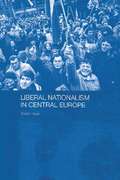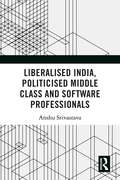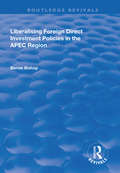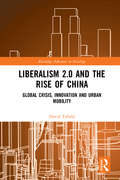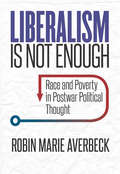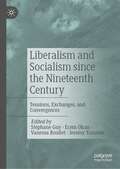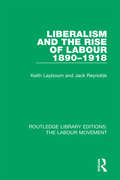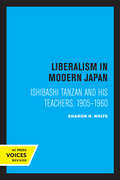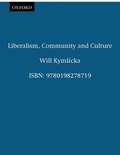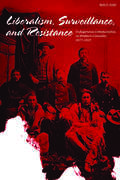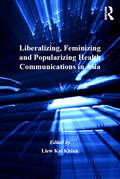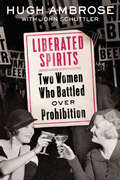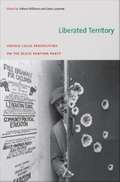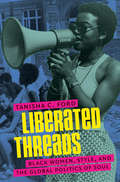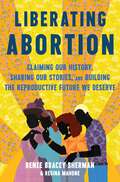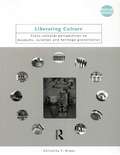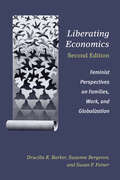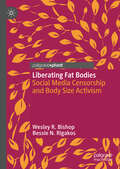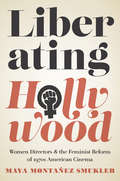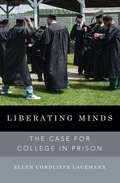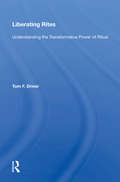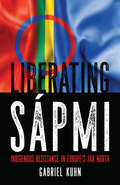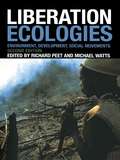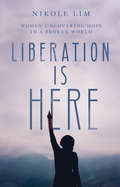- Table View
- List View
Liberal Nationalism in Central Europe
by Stefan AuerAfter the collapse of communism there was a widespread fear that nationalism would pose a serious threat to the development of liberal democracy in the countries of central Europe. This book examines the role of nationalism in post-communist development in central Europe, focusing in particular on Poland, the Czech Republic and Slovakia. It argues that a certain type of nationalism, that is liberal nationalism, has positively influenced the process of postcommunist transition towards the emerging liberal democratic order.
Liberal Racism
by Jim Sleeperthis is a tough-minded, provocative indictment of the failure of liberalism in the post-Civil Rights era. As Sleeper sees it, liberals once held the moral high ground because they "fought nobly to help this country rise above color." Now, however, liberals have become blinded by race and have abandoned the fight to create what Sleeper calls the "transracial belonging and civic faith for which Americans of all colors so obviously yearn." Much of what Sleeper has to say here flies in the face of politically correct received wisdom about race, but as an effort to remind Americans that all of us are fundamentally responsible for our fates, this is a much-needed corrective to race-based thinking that has proven unproductive.
Liberalised India, Politicised Middle Class and Software Professionals
by Anshu SrivastavaThis volume explores the emergence, evolution and definition of the middle class in India. As a class created as the interpreters between the colonial rulers and the millions whom they governed in the pre-Independence era, the Indian middle class has existed in congruence with the state, occupying vital positions in state administration. Since Independence, this middle class underwent major sociological change as they live independent of the state, which affected their social, economic and political position, reaping benefits of liberalisation and globalisation through education and employment. An otherwise internally differentiated and heterogeneous group, the new Indian middle class often unifies itself to shape socio-political discourse that affects politics and policymaking, from domestic to international affairs. This volume analyses this class phenomenon through a close study of a new metropolitan middle class in India – the software professionals, emblematic of the 'new India’. It discusses this emerging class as a political category and their engagements with the state, democracy, political parties, issues of gender, basic necessities and social justice. Further, it discusses their social action and ‘middle class activism’ for issues such as environment, cleanliness and corruption, particularly highlighting its presence in the private sector and electronic media. A fresh perspective on India’s political milieu, this volume will be of interest to scholars and researchers of sociology, modern Indian history, political science, economics and South Asia studies.
Liberalising Foreign Direct Investment Policies in the APEC Region (Routledge Revivals Ser.)
by Bernie BishopThis title was first published in 2001. This work is a response to criticisms that investment liberalization in the APEC region is not moving quickly enough. It commences with a historical overview of APEC's process for investment liberalization and a description of current foreign direct investment policies for each of the APEC economies. It then argues that there are significant constraints to further liberalization arising from economic development concerns in the developing countries and political considerations in both developed and developing countries in the region. It also suggests that a truly liberalized investment environment would involve the removal of investment incentives. Again, there are political and institutional reasons that make this difficult. With several suggestions for further research that should better inform policy makers, this is an informative insight into the complex issues involved in the liberalization process in the APEC region.
Liberalism 2.0 and the Rise of China: Global Crisis, Innovation and Urban Mobility (Routledge Advances in Sociology)
by David TyfieldWhat can we do in this period of historic, global turbulence? Mainstream narratives have no plausible account of how to stop exacerbating the multiple, overlapping challenges; much less begin to address them meaningfully. The only thing everyone agrees is innovation will be needed. But what is innovation? Usually, it is understood as new technologies that will ‘solve’ specific ‘problems’ – and, it is hoped, return life to a ‘business as usual’ of progress in individual freedom and wealth. But innovation is a thoroughly social process with profound implications for the arrangement of power in a society, hence shaping the emergence of new social systems. Exploring evidence from the key arenas of low-carbon innovation, including in the pivotal location of a rising China, this book describes the global systemic crisis of a neoliberal world order and the embryonic emergence of an alternative global power regime of a ‘liberalism 2.0’. This augurs both a web 2.0-based revitalization of the classical liberalism of the nineteenth century and new Dickensian inequalities and injustices. Against hopes that the present is a ‘revolutionary’ moment, therefore, political engagement with this emerging power regime is thus presented as the most productive strategy for a progressive twenty-first century politics.
Liberalism Is Not Enough: Race and Poverty in Postwar Political Thought
by Robin Marie AverbeckIn this intellectual history of the fraught relationship between race and poverty in the 1960s, Robin Marie Averbeck offers a sustained critique of the fundamental assumptions that structured liberal thought and action in postwar America. Focusing on the figures associated with "Great Society liberalism" like Daniel Patrick Moynihan, David Riesman, and Arthur Schlesinger Jr., Averbeck argues that these thinkers helped construct policies that never truly attempted a serious attack on the sources of racial inequality and injustice.In Averbeck's telling, the Great Society's most notable achievements--the Civil Rights Act and the Voting Rights Act--came only after unrelenting and unprecedented organizing by black Americans made changing the inequitable status quo politically necessary. And even so, the discourse about poverty created by liberals had inherently conservative qualities. As Liberalism Is Not Enough reveals, liberalism's historical relationship with capitalism shaped both the initial content of liberal scholarship on poverty and its ultimate usefulness to a resurgent conservative movement.
Liberalism and Socialism since the Nineteenth Century: Tensions, Exchanges, and Convergences
by Vanessa Boullet Stéphane Guy Ecem Okan Jeremy TranmerThis book aims to re-evaluate the relations between two major ideologies that have been increasingly contested in recent years, yet continue to be invoked or rejected as foundational systems for political thought or action. With socialism conceiving of itself as an alternative to economic liberalism, the two systems of thought emerged partially in opposition to each other. However, this book seeks to redefine their specificities and the way in which they have not only opposed each other but drew on common notions or paradigms to become both competing and complementary systems of thought and practices. With contributions from eminent political scientists and historians of political and economic thought, the book examines how the polarisation of debates and politicisation of concepts such as property, freedom, the individual, or the State, serve to construct the adversary and form a basis for political commitment. Offering an interdisciplinary assessment of the relation between liberalism and socialism, the authors help to make sense of current debate on individual freedom, political obligation and the changing role of the State. Providing an innovative perspective, this edited collection will be of interest to scholars and students researching political and economic thought, history or science, as well as anyone seeking to understand current developments affecting Western societies, and their past, present, and future ideologies.
Liberalism and the Rise of Labour 1890-1918 (Routledge Library Editions: The Labour Movement #24)
by Jack Reynolds Keith LaybournFirst published in 1984. This book is a detailed study of the way in which the growing Labour movement gradually ousted the Liberals in West Yorkshire between 1890 and 1924. It demonstrates the basis of old Liberalism and the strength of local non-conformity, and its powerful links with the textile and engineering industries. It shows how the Liberalism of this district was dominated by small groups of well-to-do leaders involved in these main industries. This study also shows the gradual breakdown of the political consensus established between the Liberal party and the working classes and explains how the increasing opposition to Liberalism was channelled into the socialist movement. In all, the authors present a thorough and extensive study of the political changes in a particularly interesting part of the British Isles.
Liberalism in Modern Japan: Ishibashi Tanzan and his Teachers, 1905-1960
by Sharon NolteThis title is part of UC Press's Voices Revived program, which commemorates University of California Press’s mission to seek out and cultivate the brightest minds and give them voice, reach, and impact. Drawing on a backlist dating to 1893, Voices Revived makes high-quality, peer-reviewed scholarship accessible once again using print-on-demand technology. This title was originally published in 1987.
Liberalism, Community and Culture
by Will KymlickaLiberalism is often described as a theory about the proper relationship between the individual and the state, but it also contains a broader account of the relationship between the individual and society. This book presents the liberal view about the nature and value of community and culturein an unusually explicit and systematic way, and links it to more familiar liberal views on individual rights and state neutrality.
Liberalism, Surveillances and Resistance
by Keith D. SmithIndigenous communities in Western Canada, 1877-1927
Liberalizing, Feminizing and Popularizing Health Communications in Asia
by Liew Kai KhiunLiberalizing, Feminizing and Popularizing Health Communications in Asia provides insights into the manner in which biomedical discourses are communicated and portrayed in Asia in light of the rapidly evolving socio-cultural, technological and epidemiological undercurrents. Highlighting the more pluralized and interactive dynamics in the appropriation and dissemination of medical and public health knowledge, its specific case studies challenge the notions of the one way transmission of medicine by modern Western trained doctors and public health officials to ignorant patients and masses, particularly in the non-Western world. With specific examples drawn from popular media, this volume examines the extent to which these developments have given the broader public both greater access to information and choices. Multidisciplinary in scope and truly international in focus, it relates the everyday of health communications to more macro social trends on the Asian continent and will be of interest to scholars within science and technology studies, media and cultural studies and sociology alike.
Liberated Spirits: Two Women Who Battled Over Prohibition
by Hugh Ambrose John SchuttlerA provocative new take on the women behind a perennially fascinating subject--Prohibition--by bestselling author and historian Hugh Ambrose.The passage of the 18th Amendment (banning the sale of alcohol) and the 19th (women's suffrage) in the same year is no coincidence. These two Constitutional Amendments enabled women to redefine themselves and their place in society in a way historians have neglected to explore. Liberated Spirits describes how the fight both to pass and later to repeal Prohibition was driven by women, as exemplified by two remarkable women in particular. With fierce drive and acumen, Mabel Willebrandt transcended the tremendous hurdles facing women lawyers and was appointed Assistant Attorney General. Though never a Prohibition campaigner, once in office she zealously pursued enforcement despite a corrupt and ineffectual agency.Wealthy Pauline Sabin had no formal education in law or government but she too fought entrenched discrimination to rise in the ranks of the Republican Party. While Prohibition meant little to her personally--aristocrats never lost access to booze--she seized the fight to repeal it as a platform to bring newly enfranchised women into the political process and compete on an equal footing with men.Along with a colorful cast of supporting characters, from rumrunners and Prohibition agents on the take to senators and feuding society matrons, Liberated Spirits brings the Roaring Twenties to life in a brand new way.
Liberated Territory: Untold Local Perspectives On the Black Panther Party
by Jama Lazerow Yohuru WilliamsWith their collection In Search of the Black Panther Party, Yohuru Williams and Jama Lazerow provided a broad analysis of the Black Panther Party and its legacy. In Liberated Territory, they turn their attention to local manifestations of the organization, far away from the party's Oakland headquarters. This collection's contributors, all historians, examine how specific party chapters and offshoots emerged, developed, and waned, as well as how the local branches related to their communities and to the national party. The histories and character of the party branches vary as widely as their locations. The Cape Verdeans of New Bedford, Massachusetts, were initially viewed as a particular challenge for the local Panthers but later became the mainstay of the Boston-area party. In the early 1970s, the Winston-Salem, North Carolina, chapter excelled at implementing the national Black Panther Party's strategic shift from revolutionary confrontation to mainstream electoral politics. In Detroit, the Panthers were defined by a complex relationship between their above-ground activities and an underground wing dedicated to armed struggle. While the Milwaukee chapter was born out of a rising tide of black militancy, it ultimately proved more committed to promoting literacy and health care and redressing hunger than to violence. The Alabama Black Liberation Front did not have the official imprimatur of the national party, but it drew heavily on the Panthers' ideas and organizing strategies, and its activism demonstrates the broad resonance of many of the concerns articulated by the national party: the need for jobs, for decent food and housing, for black self-determination, and for sustained opposition to police brutality against black people. Liberated Territory reveals how the Black Panther Party's ideologies, goals, and strategies were taken up and adapted throughout the United States. Contributors: Devin Fergus, Jama Lazerow, Ahmad A. Rahman, Robert W. Widell Jr. , Yohuru Williams
Liberated Threads: Black Women, Style, and the Global Politics of Soul (Gender and American Culture)
by Tanisha FordFrom the civil rights and Black Power era of the 1960s through antiapartheid activism in the 1980s and beyond, black women have used their clothing, hair, and style not simply as a fashion statement but as a powerful tool of resistance. Whether using stiletto heels as weapons to protect against police attacks or incorporating African-themed designs into everyday wear, these fashion-forward women celebrated their identities and pushed for equality.In this thought-provoking book, Tanisha C. Ford explores how and why black women in places as far-flung as New York City, Atlanta, London, and Johannesburg incorporated style and beauty culture into their activism. Focusing on the emergence of the "soul style" movement--represented in clothing, jewelry, hairstyles, and more--Liberated Threads shows that black women's fashion choices became galvanizing symbols of gender and political liberation. Drawing from an eclectic archive, Ford offers a new way of studying how black style and Soul Power moved beyond national boundaries, sparking a global fashion phenomenon. Following celebrities, models, college students, and everyday women as they moved through fashion boutiques, beauty salons, and record stores, Ford narrates the fascinating intertwining histories of Black Freedom and fashion.
Liberating Abortion: Claiming Our History, Sharing Our Stories, and Building the Reproductive Future We Deserve
by Renee Bracey Sherman Regina MahoneA galvanizing history of abortion recentering people of color to put forth a timely argument that we must liberate abortion for all.People of color have been having abortions since the dawn of time, yet our access is continuously under attack. In Liberating Abortion, award-winning abortion activist Renee Bracey Sherman and journalist Regina Mahone illustrate the long racist history that brought us to this moment, uncover the hidden figures who set the foundation activists and storytellers are building on today, and explain how abortion has been and remains essential to the health of our communities.Liberating Abortion will take you back to the basics of sex education, detailing the traditions of abortion over centuries , while examining how society makes us feel about our experiences. You’ll find rigorous research, never-before-heard stories, and eye-opening interviews with over 50 people of color who’ve had abortions, including activists, actresses, television writers, politicians, and the two Black members of Jane, the Chicago feminist service that provided abortions before Roe. With poignant storytelling and precise analysis, Liberating Abortion will change how you think about abortion forever.
Liberating Culture: Cross-Cultural Perspectives on Museums, Curation and Heritage Preservation (Museum Meanings)
by Christina KrepsUsing examples of indigenous models from Indonesia, the Pacific, Africa and native North America, Christina Kreps illustrates how the growing recognition of indigenous curation and concepts of cultural heritage preservation is transforming conventional museum practice. Liberating Culture explores the similarities and differences between Western and non-Western approaches to objects, museums, and curation, revealing how what is culturally appropriate in one context may not be in another. For those studying museum culture across the world, this book is essential reading.
Liberating Economics, Second Edition: Feminist Perspectives on Families, Work, and Globalization
by Susan F. Feiner Suzanne Bergeron Drucilla BarkerIn this brand-new critical analysis of economics, Barker, Bergeron, and Feiner provide a feminist understanding of the economic processes that shape households, labor markets, globalization, and human well-being to reveal the crucial role that gender plays in the economy today. With all new and updated chapters, the second edition of Liberating Economics examines recent trends in inequality, global indebtedness, crises of care, labor precarity, and climate change. Taking an interdisciplinary and intersectional feminist approach, the new edition places even more emphasis on the ways that gender, race, class, sexuality, and nationality shape the economy. It also highlights the centrality of social reproduction in economic systems and makes connections between the economic circumstances of women in global North and global South. Throughout, the authors reject the idea that there is no alternative to our current neoliberal market economy and offer alternative ways of thinking about and organizing economic systems in order to achieve gender-equitable outcomes. Written in an accessible and engaging style, this book will be of interest to students and scholars across a range of fields, policymakers, and any reader interested in creating just futures.
Liberating Fat Bodies: Social Media Censorship and Body Size Activism
by Wesley R. Bishop Bessie N. RigakosUsing a multidisciplinary and intersectional approach, this book explores the social factors that influence the ways in which societal norms police fat bodies. Chapters examine the racist and colonial constructions of Western beauty norms as well as the evolution of anti-fat bias and fat liberation, before delving into the relationship between social media and body size activism, with a particular emphasis on social media companies censoring fat people. The authors draw on first-person narratives of artists, activists, and fat social media users to unpack how, these mostly women, have used their bodies to transform the negative social perceptions of fat people. This book will be of interest to scholars and students in Sociology, Gender Studies, History, and Media Studies who research body size activism and beauty norms.
Liberating Hollywood: Women Directors and the Feminist Reform of 1970s American Cinema
by Maya SmuklerLiberating Hollywood examines the professional experiences and creative output of women filmmakers during a unique moment in history when the social justice movements that defined the 1960s and 1970s challenged the enduring culture of sexism and racism in the U.S. film industry. Throughout the 1970s feminist reform efforts resulted in a noticeable rise in the number of women directors, yet at the same time the institutionalized sexism of Hollywood continued to create obstacles to closing the gender gap. Maya Montañez Smukler reveals that during this era there were an estimated sixteen women making independent and studio films: Penny Allen, Karen Arthur, Anne Bancroft, Joan Darling, Lee Grant, Barbara Loden, Elaine May, Barbara Peeters, Joan Rivers, Stephanie Rothman, Beverly Sebastian, Joan Micklin Silver, Joan Tewkesbury, Jane Wagner, Nancy Walker, and Claudia Weill. Drawing on interviews conducted by the author, Liberating Hollywood is the first study of women directors within the intersection of second wave feminism, civil rights legislation, and Hollywood to investigate the remarkable careers of these filmmakers during one of the most mythologized periods in American film history.
Liberating Minds: The Case for College in Prison
by Ellen Condliffe LagemannAn authoritative and thought-provoking argument for offering free college in prisons—from the former dean of the Harvard Graduate School of Education. Anthony Cardenales was a stickup artist in the Bronx before spending seventeen years in prison. Today he is a senior manager at a recycling plant in Westchester, New York. He attributes his ability to turn his life around to the college degree he earned in prison. Many college-in-prison graduates achieve similar success and the positive ripple effects for their families and communities, and for the country as a whole, are dramatic. College-in-prison programs have been shown to greatly reduce recidivism. They increase post-prison employment, allowing the formerly incarcerated to better support their families and to reintegrate successfully into their communities. College programs also decrease violence within prisons, improving conditions for both correction officers and the incarcerated. Liberating Minds eloquently makes the case for these benefits and also illustrates them through the stories of formerly incarcerated college students. As the country confronts its legacy of over-incarceration, college-in-prison provides a corrective on the path back to a more democratic and humane society. &“Lagemann includes intensive research, but her most powerful supporting evidence comes from the anecdotes of former prisoners who have become published poets, social workers, and nonprofit leaders.&”—Publishers Weekly
Liberating Rites: Understanding The Transformative Power Of Ritual
by Tom F. DriverThis book shows how necessary ritual is to human freedom and to social processes of liberation. It aims to reflect upon the deep human longing for ritual and to interpret it in the light of our physical, social, political, sexual, moral, aesthetic, and religious existence. .
Liberating Sápmi: Indigenous Resistance in Europe's Far North
by Gabriel KuhnThe Sámi, who have inhabited Europe's far north for thousands of years, are often referred to as the continent's "forgotten people." With Sápmi, their traditional homeland, divided between four nation-states—Norway, Sweden, Finland, and Russia—the Sámi have experienced the profound oppression and discrimination that characterize the fate of indigenous people worldwide: their lands have been confiscated, their beliefs and values attacked, their communities and families torn apart. Yet the Sámi have shown incredible resilience, defending their identity and their territories and retaining an important social and ecological voice—even if many, progressives and leftists included, refuse to listen. Liberating Sápmi is a stunning journey through Sápmi and includes in-depth interviews with Sámi artists, activists, and scholars boldly standing up for the rights of their people. In this beautifully illustrated work, Gabriel Kuhn, author of over a dozen books and our most fascinating interpreter of global social justice movements, aims to raise awareness of the ongoing fight of the Sámi for justice and self-determination. The first accessible English-language introduction to the history of the Sámi people and the first account that focuses on their political resistance, this provocative work gives irrefutable evidence of the important role the Sámi play in the resistance of indigenous people against an economic and political system whose power to destroy all life on earth has reached a scale unprecedented in the history of humanity. The book contains interviews with Mari Boine, Harald Gaski, Ann-Kristin Håkansson, Aslak Holmberg, Maxida Märak, Stefan Mikaelsson, May-Britt Öhman, Synnøve Persen, Øyvind Ravna, Niillas Somby, Anders Sunna, and Suvi West.
Liberation Ecologies: Environment, Development and Social Movements
by Richard Peet Michael WattsLiberation Ecologies brings together some of the most exciting theorists in the field to explore the impact of political ecology in today's developing world. The book casts new light on the crucial interrelations of development, social movements and the environment in the South - the 'bigger' half of our planet - and raises questions and hopes about change on the global scale. The in-depth case material is drawn from across the Developing World, from Latin America, Africa and Asia. The issues raised in contemporary political, economic and social theory are illustrated through these case studies. Ultimately, Liberation Ecologies questions what we understand by 'development', be it mainstream or alternative, and seeks to renew our sense of nature's range of possibilities.
Liberation Is Here: Women Uncovering Hope in a Broken World
by Nikole LimAs a freelance filmmaker, Nikole Lim's career allowed her to step in and out of the lives of marginalized people around the world. But when confronted with the prevalence of sexual violence in Kenyan and Zambian communities, she commits to advocating alongside the courageous survivors whose lives have intersected with hers. These women's powerful stories inspire her to embark on a new vocation, partnering with survivors of sexual violence to launch a nonprofit organization that equips women to lead through the rewritten stories of their lives. But as Lim seeks to help her friends experience healing and liberation, her perspective is altered. Spiritually depleted, she finds herself ministered to by the women she came to serve—the once oppressed become her liberators. Illustrated with dramatic full-color photography from Lim's own camera, Liberation Is Here transports us to forgotten corners of the world. From the slums of Nairobi, hospitals of Lusaka, killing fields of Kigali, and the back alleys of Barcelona, Lim weaves together a narrative of God’s grace and healing amid fear and trauma. Her journey proves that liberation is not just near, but it is here—in the eyes of the broken, the hearts of the oppressed, and the untold stories of our global community.
